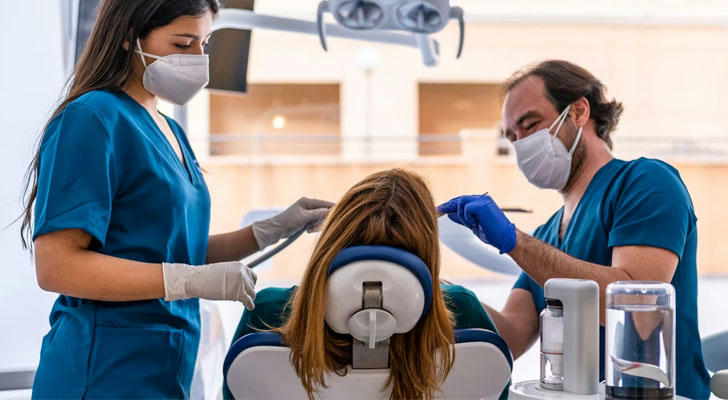🦷 Start a Rewarding Career as a Dental Assistant in the U.S.
If you're looking for a stable, in-demand career in healthcare that doesn’t require years of medical school, becoming a Dental Assistant may be the perfect path. With short training programs, strong job growth, and meaningful patient interaction, this role offers a practical entry point into the dental field.

What Does a Dental Assistant Do?
Dental Assistants play a crucial role in dental clinics and offices. They support dentists during procedures, help prepare patients, manage equipment, and handle administrative tasks.
Typical responsibilities include:
・Sterilizing instruments and setting up exam rooms
・Assisting during dental procedures such as fillings, crowns, and cleanings
・Taking and developing X-rays
・Educating patients on oral hygiene
・Scheduling appointments and managing patient records
Why Is It a Popular Career Choice?
According to the U.S. Bureau of Labor Statistics (BLS), the employment of Dental Assistants is expected to grow 7% from 2022 to 2032, faster than the average for all occupations. This demand is driven by an aging population, growing awareness of oral health, and the expansion of dental care services.
Key advantages:
・Quick training: Most programs take 9–12 months
・No college degree required
・Flexible work environments: Clinics, private offices, orthodontic and pediatric practices
・Strong job placement: Many programs offer externships that lead to employment
Training and Certification
To become a Dental Assistant, you can complete a diploma or certificate program offered at community colleges, vocational schools, or technical institutes.
Common coursework includes:
・Dental anatomy and terminology
・Infection control and sterilization techniques
・Radiology (X-rays)
・Chairside assisting procedures
・CPR and emergency protocols
Some states require licensure or registration. The Dental Assisting National Board (DANB) offers the Certified Dental Assistant (CDA) credential, widely recognized and often preferred by employers.
Salary Expectations
Dental Assistants earn a solid income relative to the short training period. According to BLS:
・Median hourly wage: $21.80
・Annual salary range: $38,000 to $58,000
・Top-paying states: Minnesota, Alaska, Massachusetts
Many employers also offer benefits such as health insurance, 401(k) plans, paid vacation, and professional development support.
Real Success Story
Amanda R., 27, from Texas, enrolled in a Dental Assistant program at a local community college after leaving a retail job. Within 10 months, she started working at a pediatric dental office.
“I love the hands-on nature of the job, and the hours are perfect for my family. It’s been a total career upgrade.”
Additional Career Paths and Advancement
Becoming a Dental Assistant can be a stepping stone to other healthcare roles. With additional education and certification, many Dental Assistants advance to positions such as:
・Expanded Functions Dental Assistant (EFDA)
・Dental Office Manager
・Dental Hygienist (with associate degree and licensure)
Some employers offer tuition reimbursement or continuing education incentives to support career progression.
Diversity and Accessibility
This career path is also known for its accessibility. According to the American Dental Assistants Association, over 90% of dental assistants are women, and the field has increasingly attracted working adults, career changers, and high school graduates seeking stable employment. Many programs offer evening or hybrid classes to accommodate busy schedules.
How to Get Started
1.Research your state’s dental board requirements
2.Find an accredited training program (many offer job placement assistance)
3.Apply for financial aid if needed
4.Complete the coursework and clinical hours
5.Take the DANB exam, if required
6.Begin applying for positions

FAQ
Q1: Do I need certification to work as a Dental Assistant? A: Not all states require certification, but having one like the CDA from DANB can improve job prospects and pay.
Q2: Can I work part-time as a Dental Assistant? A: Yes. Many clinics offer flexible hours, including part-time and weekend shifts.
Q3: Is it possible to specialize? A: Absolutely. Dental Assistants can specialize in orthodontics, oral surgery, or pediatric care, depending on additional training.
Q4: How competitive is the job market? A: It’s a high-demand field. The BLS projects over 56,000 new openings in the next decade.
Final Thoughts
If you’re passionate about healthcare, enjoy helping others, and want a career with job security and room for growth, becoming a Dental Assistant is a smart and practical choice. With relatively low entry barriers, supportive training options, and strong industry demand, this career can provide both stability and satisfaction.
